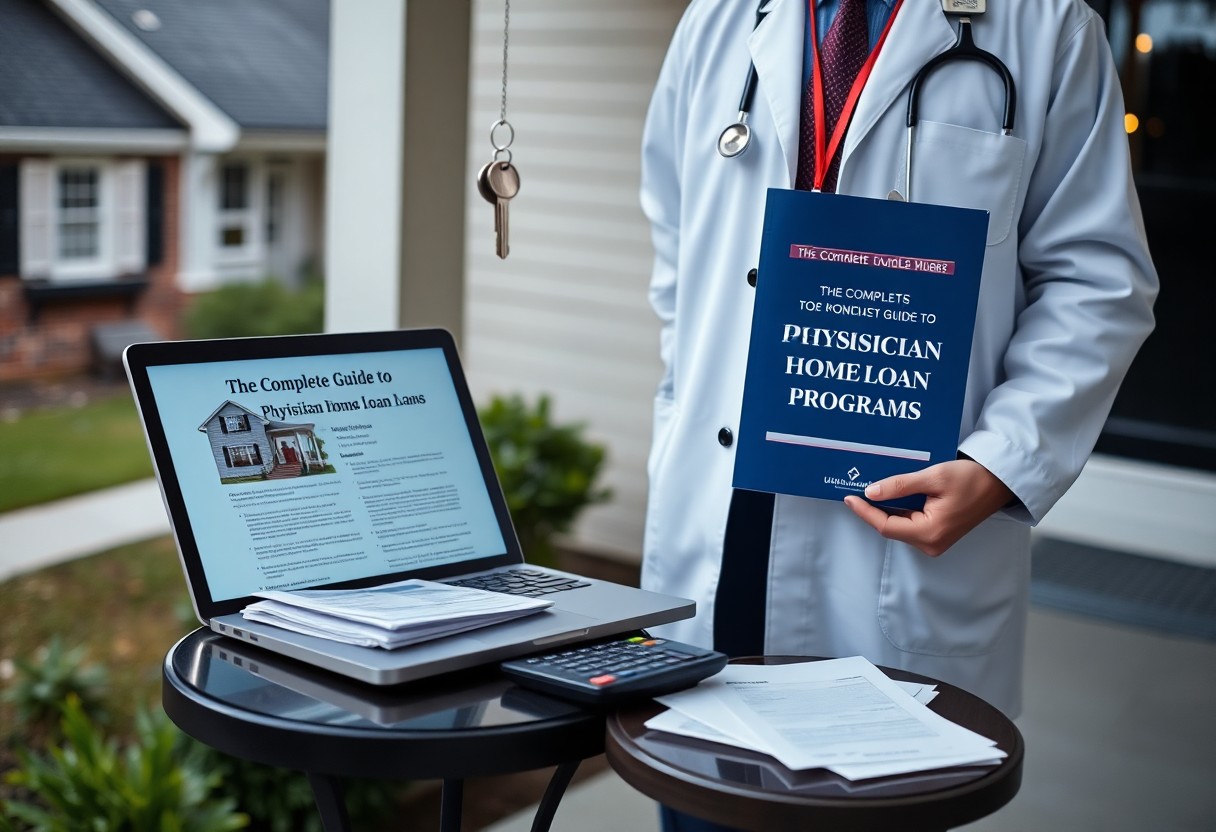There’s a unique process when it comes to purchasing a home as a physician, particularly when leveraging a doctor loan. This comprehensive checklist will guide you through important steps, from understanding the specifics of your loan options to navigating the complexities of the housing market. With tailored advice and insights, you’ll be well-prepared to make informed decisions that best suit your financial situation and lifestyle. Let’s ensure that your home buying journey is smooth and successful.
Understanding Doctor Loans
Doctor loans offer financing options specifically designed for physicians, allowing you to purchase a home without the standard limitations associated with conventional loans. These loans acknowledge your unique financial situation, typically accommodating high debt-to-income ratios and minimizing the need for a substantial down payment.
What is a Doctor Loan?
A doctor loan is a type of mortgage tailored for medical professionals such as doctors, dentists, and veterinarians. These loans are structured to facilitate home buying for new graduates and established practitioners alike, often featuring no down payment, lower interest rates, and flexible credit requirements.
Eligibility Requirements
To qualify for a doctor loan, you typically must be a licensed physician or in a residency program. Lenders may require you to provide proof of your medical degree and employment offer, particularly for those who have recently completed their training. Additionally, specific lenders may have preferences regarding your specialty or the timing of your residency or fellowship completion.
Eligibility for a doctor loan usually includes verification of your license and education, along with employment details. Many lenders also require a credit score of around 680 or higher, though some exceptions exist. Income potential post-training can heavily influence your loan terms, meaning if you show evidence of a stable job offer or your existing high earning potential, you may qualify for better rates and terms. Moreover, many lenders allow you to include future income as a factor in their decision-making process, which is especially beneficial for those just starting their careers.

Advantages of Using a Doctor Loan
Doctor loans come with several advantages tailored to meet the financial needs of physicians, making homeownership more accessible. These specialized loans often feature favorable terms, allowing you to focus more on your medical career rather than on stringent lending criteria. With unique benefits like lower down payments and reduced mortgage insurance, home buying can become a more manageable and less stressful process.
Lower Down Payments
One significant benefit of doctor loans is the option for lower down payments, which can be as little as 0% to 10%. This is particularly advantageous for you as a newly graduated physician who may have substantial student debt but not yet substantial savings. With this flexibility, you can retain more cash for other expenses, like moving costs or setting up your new home.
Reduced Mortgage Insurance
Unlike conventional loans, doctor loans typically require little to no private mortgage insurance (PMI), which can save you hundreds of dollars each month. This reduction in mortgage insurance expenses is vital for you as it directly lowers your monthly payments and overall cost of borrowing. It allows you to invest more in your practice or personal life while easing the financial burden of homeownership.
By eliminating PMI requirements, doctors can substantially reduce their monthly obligations, which can be especially beneficial during early career years when your income is still stabilizing. For instance, traditional loans might charge around 0.5% to 1% of the mortgage amount annually in PMI, translating to significant savings over time. This financial advantage enables you to allocate funds toward establishing your practice or personal investments rather than paying for additional insurance coverage.
Preparing Financially for Home Buying
Approaching home buying as a physician means you must prepare financially to navigate the unique factors at play. From understanding the income potential as a practicing physician to grasping the implications of your student loans, having a solid financial foundation will empower you in your search for the right property. Establishing your financial standing before you start looking can help streamline the process of securing your doctor loan and finding a home that fits your needs.
Assessing Your Budget
Begin by evaluating your monthly income and expenses to establish a realistic budget for your home purchase. Factor in your student loan repayments, existing debts, and anticipated living expenses. Assess how much you can comfortably allocate toward a monthly mortgage payment, and include future costs such as property taxes, homeowners insurance, and potential maintenance fees. This comprehensive budget analysis will provide a clearer picture of the price range within which you can operate.
Understanding Credit Scores
Your credit score plays a significant role in determining the terms of your doctor loan and interest rates. Lenders view a higher credit score as a sign of reliability, often resulting in more favorable borrowing conditions. Typically, a score above 700 can open up advantageous loan options, while anything below may warrant further scrutiny from lenders. Checking your credit report for errors and addressing any inaccuracies can help enhance your score before applying for financing.
Credit scores typically range from 300 to 850, with scores above 700 being generally considered good. You should familiarize yourself with the three major credit bureaus—Equifax, Experian, and TransUnion—and regularly check your credit report for inaccuracies. Factors influencing your score include payment history, credit utilization, length of credit history, types of credit used, and recent inquiries. Addressing negative factors, like outstanding debts or late payments, and making timely payments on existing accounts can significantly improve your score, enhancing your borrowing power when applying for a doctor loan.
The Home Buying Process
Understanding the home buying process helps you navigate each step effectively. From securing financing to closing the deal, staying organized will ease your transition. You’ll need to prepare crucial documents, like income verification and employment letters, while staying in close communication with your lender to ensure a smooth experience. A detailed timeline will assist in managing deadlines successfully and maintaining a clear focus on your goals.
Finding a Real Estate Agent
Selecting the right real estate agent can enhance your home buying experience significantly. Look for an agent with experience in working with physician clients and knowledge of doctor loan programs. They should understand the unique needs of medical professionals, such as the importance of proximity to hospitals or medical facilities. Consider interviewing multiple agents to assess their familiarity with your desired market and ensure they align with your preferences.
Home Inspections and Appraisals
Home inspections and appraisals are integral components of the buying process. An inspection reveals the property’s condition and potential issues, while an appraisal ensures that the home’s value aligns with your loan requirements. This assessment protects your investment by highlighting crucial repairs and providing peace of mind about your decision.
Engaging a qualified home inspector can help you uncover hidden concerns, such as plumbing issues or mold, that could influence your purchasing decision. Similarly, appraisals typically cost around $300-$500 and assess not just the property’s worth but also market trends and comparable listings. If your home appraisal comes in lower than expected, it may necessitate renegotiation with the seller or reconsidering your offer, ensuring you don’t overpay for your new home.
Key Considerations When Choosing a Home
When purchasing a home, several key considerations can significantly impact your satisfaction and investment. Assess your lifestyle needs, including space for a family, proximity to work and amenities, and potential for future growth. It’s vital to evaluate not only the structure itself but also the surrounding community, neighborhood amenities, and overall environment, ensuring a comfortable and convenient living experience.
Location and Commute
Your daily commute can greatly affect your overall quality of life. Consider the proximity of your new home to your workplace, as well as access to major roads and public transport options. For physicians, having a commute under 30 minutes allows you to balance your demanding job while minimizing travel stress, adding time back to your day for personal activities or family.
Future Resale Value
Evaluating potential resale value is necessary for making a sound investment. Homes in desirable school districts or up-and-coming neighborhoods typically appreciate faster. Research recent trends indicating a rise in home values in certain areas; for example, a suburban neighborhood may show a 5-7% annual growth rate compared to urban areas that may stabilize more gradually. Understanding market dynamics can position you for a more profitable sale in the future.
To further assess future resale value, analyze factors such as local economic growth, developments in infrastructure, and community improvements. Consider homes with unique features that appeal broadly, such as updated kitchens or energy-efficient systems, which tend to attract buyers. In addition, consult with real estate professionals for insights on historical price trends and forecasts that align with your investment goals. Strategic foresight in your home choice can yield significant returns down the line.
Closing the Deal
Once you’ve secured your doctor loan, it’s time to finalize the purchase by closing the deal. This stage is where ownership is transferred, and you’ll sign the necessary documents. Ensure all paperwork is in order, including disclosures and any agreements with the seller. Double-check dates, contingencies, and financing terms to avoid last-minute surprises.
Understanding Closing Costs
Closing costs typically range from 2% to 5% of the home’s purchase price, encompassing various fees, such as appraisal, title insurance, and attorney fees. As a physician, you might find some loan programs offer reduced closing costs or allow for these fees to be rolled into your mortgage. Be proactive in asking your lender for a breakdown of all expected expenses.
Finalizing Your Loan Approval
Finalizing your loan approval involves providing additional documentation and ensuring everything is in compliance with lender requirements. You’ll need to verify your income, employment status, and debt-to-income ratio. Staying responsive and organized helps expedite this process, allowing you to focus on your upcoming move rather than paperwork delays.
Your lender will likely request detailed documents, such as recent pay stubs, tax returns, and bank statements, to verify financial stability. Additionally, address any credit inquiries promptly to avoid loan conditions that may hinder your approval. Be transparent and cooperative with your lender throughout this final step; it can significantly impact your closing timeline and overall experience. Understand that any discrepancies can lead to delays, so maintain open communication to resolve issues quickly.
To wrap up
So, as you navigate the process of buying a home with a doctor loan, utilize this ultimate checklist to streamline your journey. By understanding your financial options, preparing necessary documentation, and evaluating properties that suit your lifestyle, you can make informed decisions that align with your professional commitments. Your diligence in this process will empower you to secure a home that not only meets your needs but also enhances your personal and professional well-being.




